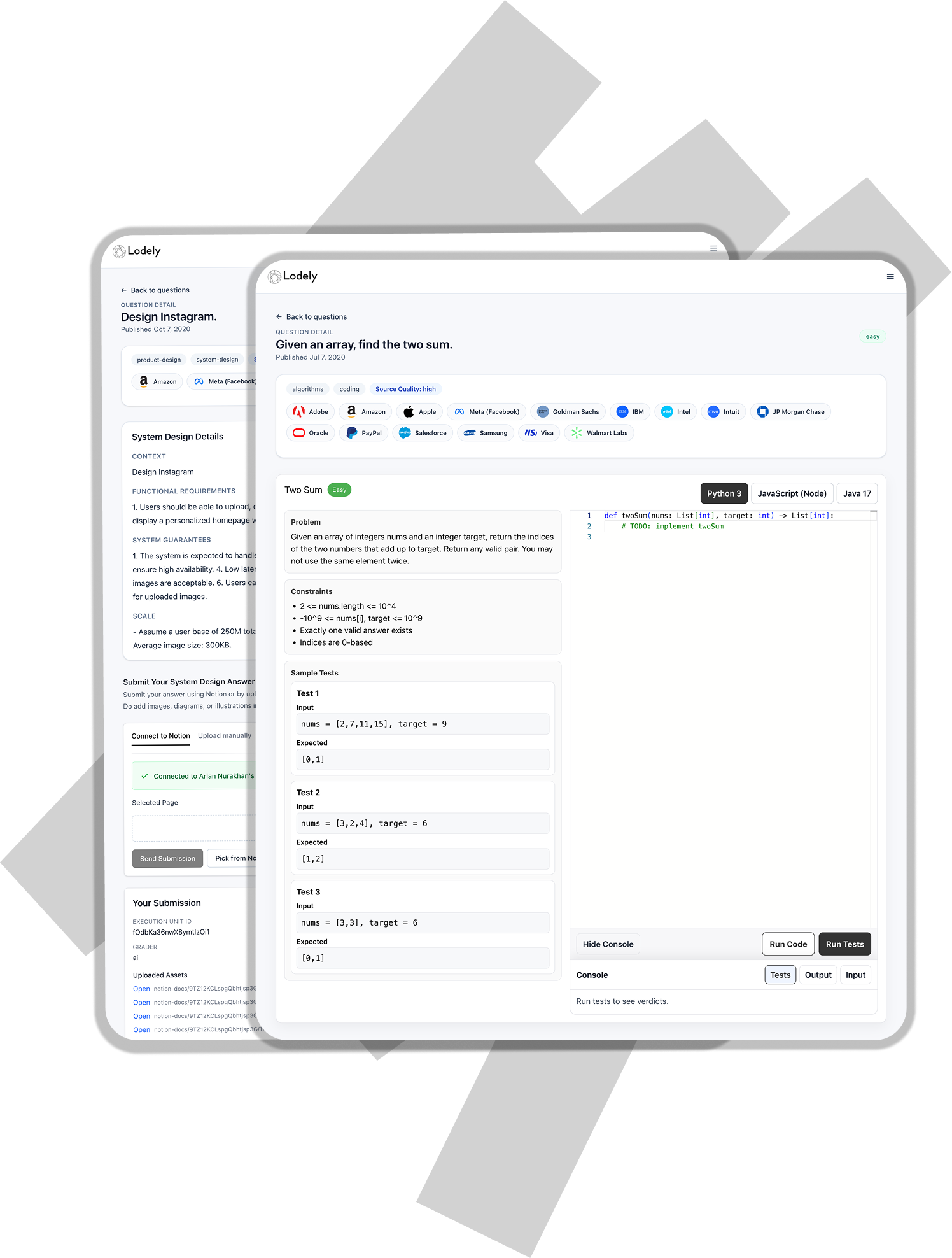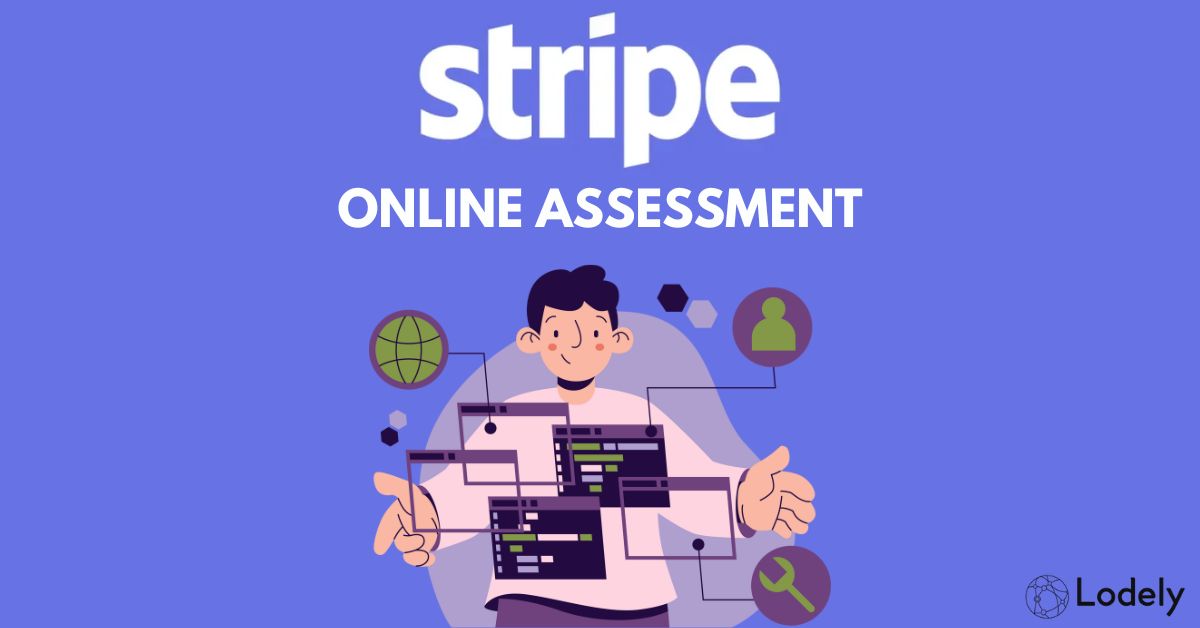Are QA Engineers Still In-Demand In 2025: Market Insight
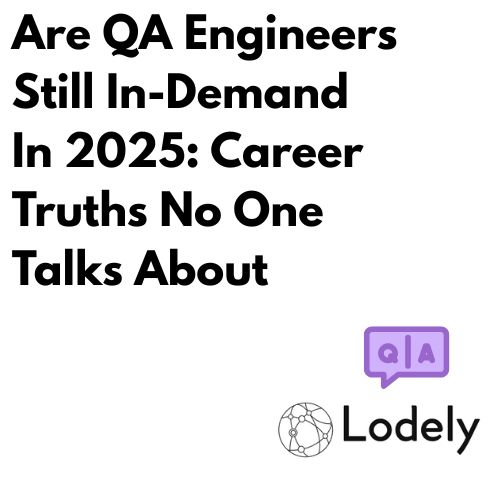
Are QA Engineers Still In-Demand In 2025: Career Truths No One Talks About
Not all tech roles survive when things shift, but the ones that do? They become mission-critical. In a world where broken code means broken trust, the people testing software are playing a different game in 2025.
Are QA Engineers Still In-Demand In 2025 isn’t just a career question - it’s a signal of what the industry actually values now.
QA Engineers in High Demand: 2025 Market Reality Check
Let me tell you straight up: QA engineering is absolutely crushing it right now. The demand is through the roof, and QA engineers are experiencing explosive job growth with serious compensation to match - we're talking about a field that's projected to grow 17% from 2023 to 2033, according to the Bureau of Labor Statistics.
Here's what gets me excited: the role has undergone a complete transformation. These aren't your traditional "click through test cases" jobs anymore. QA engineers in 2025 are strategic players who work with AI, automation, and complex systems.
The Numbers That Matter
Let me break down the real compensation data for you, because at the end of the day, that's what we all care about:
Current Market Reality:
- Median salary for QA engineers: $102,610 (Bureau of Labor Statistics, 2024)
- Average total compensation: $100,000-$105,000 across major platforms
- Entry-level range: $80,000-$97,000 (not bad for starting out!)
- Senior QA engineers: $136,000-$175,000 (now we're talking serious money)
Geographic Premiums:
- California QA engineers: $115,000+ average (15% higher than national average)
- Bay Area and major tech hubs: $150,000-$200,000+ for experienced engineers
- Remote opportunities: $90,000-$130,000 depending on company
Job Market Growth That's Actually Insane
Here's where it gets really interesting. The Bureau of Labor Statistics projects 140,100 openings per year for software developers, QA analysts, and testers. That's not total jobs - that's new openings annually.
The growth drivers are exactly what you'd expect:
- AI and machine learning expansion (someone needs to test these systems!)
- Cybersecurity concerns (QA is on the front lines of security testing)
- IoT and connected devices (everything's getting smarter and needs testing)
- Mobile and web applications (more apps = more testing needs)
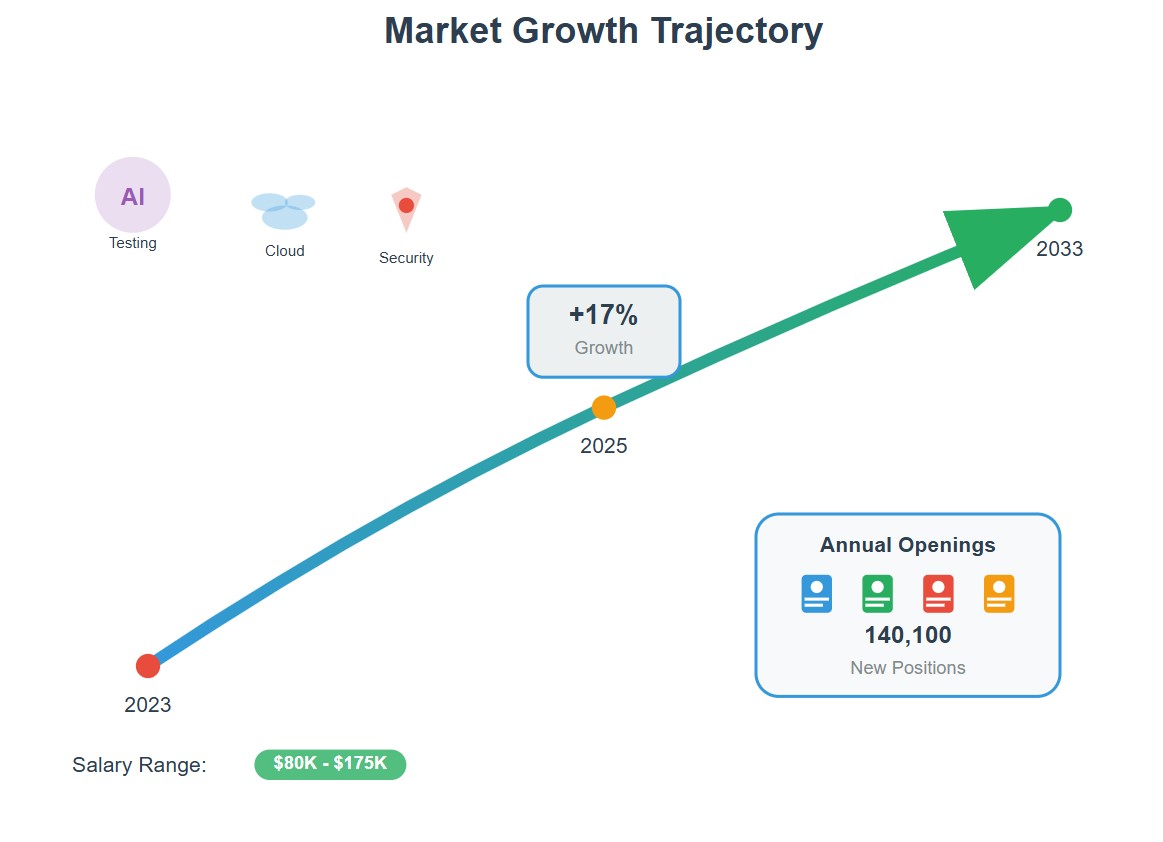
Why AI Isn't Killing QA Jobs (It's Actually Creating More)
This is the part that gets me really excited. I keep hearing people worry that AI will replace QA engineers. That's completely backwards.
Here's what's actually happening:
AI is creating new QA opportunities:
- AI testing specialists - someone needs to test the AI systems
- Automation engineers - building and maintaining AI-powered test suites
- Quality engineering roles - strategic oversight of AI testing processes
- Security testing experts - AI systems need security validation
The human element is irreplaceable:
- Critical thinking - AI can't judge what really matters to users
- Contextual risk assessment - understanding the business impact of bugs
- Creative test scenarios - thinking of edge cases AI might miss
- Stakeholder communication - explaining quality issues to non-technical teams
I've seen this firsthand. Companies aren't laying off QA engineers; they're upgrading their roles and paying them more to work with AI tools.
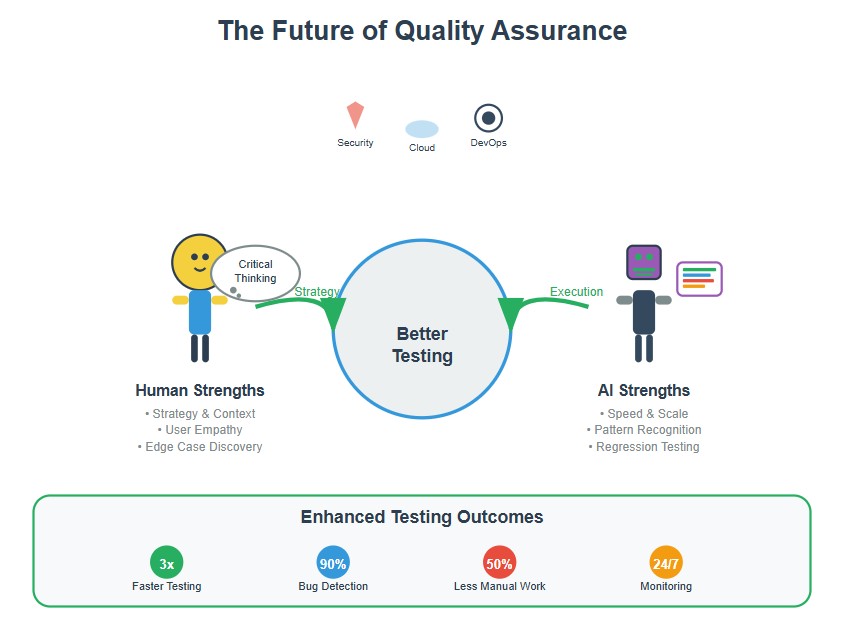
The New QA Engineer Skill Set
The QA engineers I know who are killing it in 2025 have evolved their skill sets. Here's what they're focusing on:
Technical Skills That Pay:
- Programming languages: Python, Java, JavaScript (automation is everything)
- AI testing tools: Testim, Mabl, Applitools (the future of testing)
- Cloud platforms: AWS, Azure, Google Cloud (everything's moving to the cloud)
- DevOps integration: Jenkins, Docker, Kubernetes (continuous testing)
- Security testing: OWASP, penetration testing (cybersecurity is huge)
Soft Skills That Matter:
- Communication: Explaining complex technical issues to stakeholders
- Problem-solving: Root cause analysis and critical thinking
- Adaptability: Learning new tools and methodologies quickly
- Collaboration: Working with developers, product managers, and designers
Look, I've been around tech long enough to know when something is just hype versus a real opportunity. QA engineering in 2025 is the real deal.
My advice? If you're thinking about getting into QA, stop thinking and start doing. The market is hot, the pay is good, and the opportunities are only going to grow.
Your Zero-to-Hired QA Engineering Roadmap (Land Your First Job in 6 Months)
Alright, let's cut through the BS. You want to break into QA engineering? I'm going to give you the exact playbook that I've seen work for dozens of people who made the transition successfully.
The best part? You don't need a computer science degree. I've watched career switchers from retail, finance, and even teaching land $80,000+ QA roles in less than 6 months. Here's exactly how they did it.
The 6-Month Battle Plan
This isn't some generic advice. This is the exact timeline that works. I've seen people go from zero to hired following this schedule.
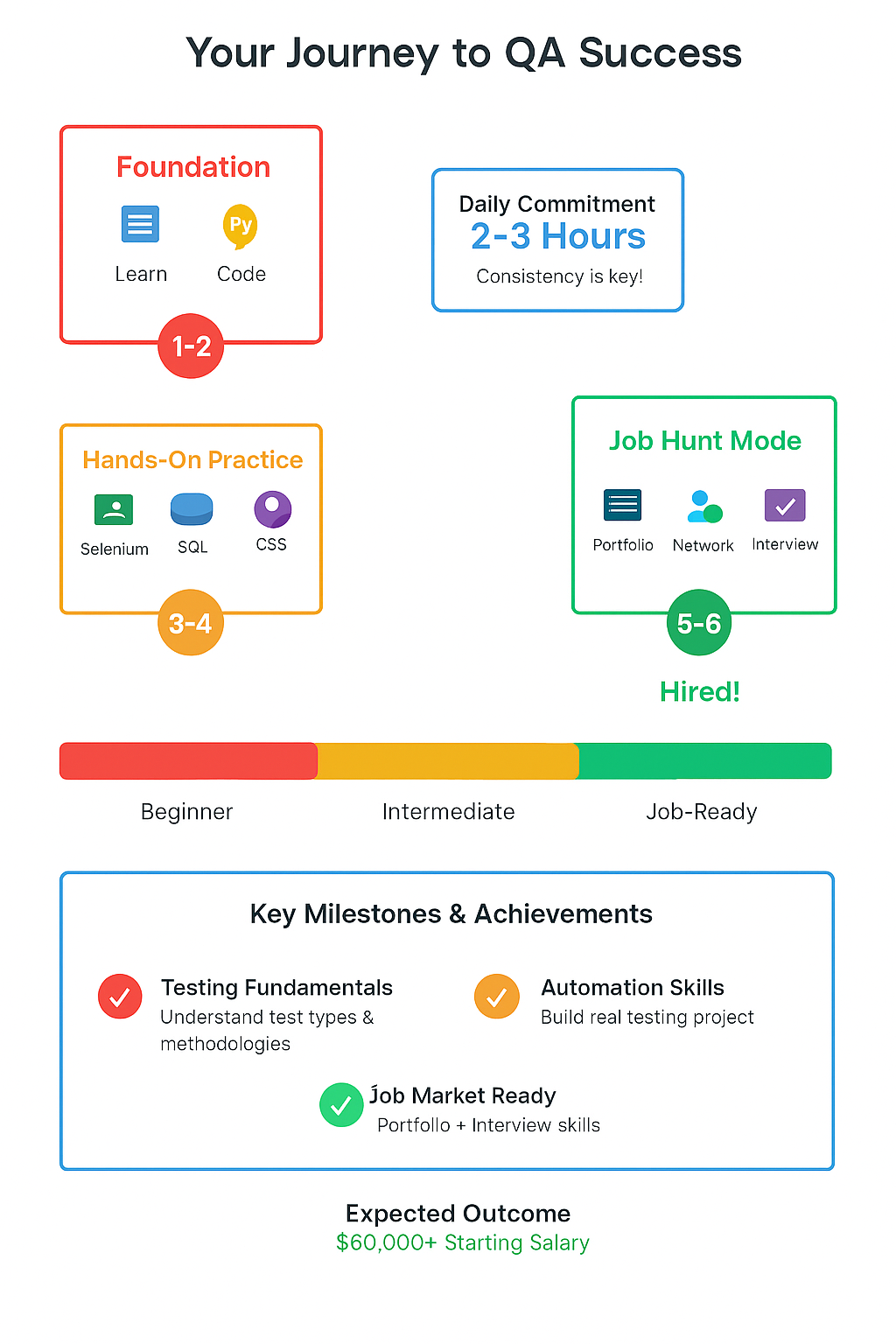
Months 1-2: Foundation Building
- Learn testing fundamentals - Start with Guru99's free testing course
- Pick ONE programming language - Python is your best bet (beginner-friendly, widely used)
- Understand different testing types - Manual, automated, API, performance, security
- Study 2-3 hours daily - Consistency beats intensity every time
Months 3-4: Get Your Hands Dirty
- Build your first automation project - Use Selenium with Python
- Learn SQL basics - Database testing is huge in QA roles
- Start contributing to open source - Find bugs in real projects, submit quality bug reports
- Practice writing test cases - Document everything like you're already on the job
Months 5-6: Job Hunt Mode
- Complete portfolio projects - 2-3 solid automation projects on GitHub
- Apply to 5-10 jobs daily - Volume is your friend at the entry level
- Network like crazy - LinkedIn, local meetups, QA communities
- Interview prep - Practice explaining your projects and testing scenarios
Free Resources That Work
I'm not going to overwhelm you with 50 links. These are the resources I personally recommend to people breaking in:
Learning Platforms:
- Guru99 - Best free testing tutorials (start here)
- Test Automation University - Free courses by Applitools
- YouTube: "Testing World" - Practical tutorials, real-world examples
- freeCodeCamp - Python and automation fundamentals
Practice Sites:
- The Internet by Herokuapp - Perfect for automation practice
- Automation Testing Practice - Real scenarios to test
- Bug reports from open source projects - Study how pros write bug reports
Communities:
- Ministry of Testing - Best QA community online
- Reddit r/QualityAssurance - Ask questions, get real answers
- LinkedIn QA groups - Network with hiring managers
Building a Portfolio That Gets You Hired
Here's what hiring managers look for in QA portfolios:
Project 1: Web Application Testing
- Find a simple e-commerce site (or use a practice site)
- Write comprehensive test cases - Cover happy path, edge cases, error scenarios
- Document bugs professionally - Use proper bug reporting format
- Show both manual and automated tests
Project 2: API Testing
- Test a public API (weather API, JSON placeholder)
- Use Postman or RestAssured - Document your test collection
- Include negative testing - What happens when things go wrong?
- Validate responses - Don't just check status codes
Project 3: Mobile App Testing
- Test a mobile app (download any free app)
- Cover different devices and OS versions - Use emulators if needed
- Focus on usability - User experience is crucial in mobile testing
- Document compatibility issues
Pro tip: Quality over quantity. Three well-documented projects beat ten half-finished ones every time.
Interview Prep That Gets You Hired
I've sat in on QA interviews, and here's what separates the winners from the rest:
Technical Questions You'll Get:
- “Walk me through testing a login page” - One of the classics in software engineer interview preparation, so have a systematic approach ready
- "What's the difference between smoke and regression testing?" - Know your testing types
- "How would you test an API?" - Show understanding of different testing layers
- "Describe a bug you found" - Have 2-3 detailed examples ready
Questions You Should Ask:
- "What testing tools does the team currently use?" - Shows you're thinking about fitting in
- "How does QA fit into the development cycle here?" - Demonstrates understanding of processes
- "What's the biggest quality challenge the team faces?" - Shows a problem-solving mindset
The Secret Sauce: Talk about testing from a user perspective. Anyone can click buttons, but QA engineers think about business impact. When discussing bugs, always mention how they affect the end user.
Job Hunting Strategies That Land Offers
Most people apply randomly and wonder why they get nowhere. Here's the strategic approach that gets you interviews and job offers.
The Application Game:
- Apply to 5-10 jobs daily - Entry-level QA has decent volume
- Target smaller companies first - They're more likely to take chances on newcomers
- Don't skip contract/temp roles - They're often stepping stones to full-time
- Use keywords from job descriptions - Tailor your resume for each application
The Network Effect:
- Connect with QA engineers on LinkedIn - Most people are happy to help
- Attend local tech meetups - In-person networking still works
- Join QA Slack communities - Real-time job tips and advice
- Consider bootcamp alumni networks - Even if you didn't attend, many welcome career changers
The Reality Check: Your first QA job might not be at Google. Take the first decent offer you get. Entry-level experience is gold, and you can always move up after 12-18 months.
If you're serious about this, pick a start date, consider support from a career coach engineering, and commit to the 6-month plan. I've seen it work too many times to count.
QA Is Not Just Relevant, It Is Leading the Way
In 2025, QA isn’t playing catch-up; it’s setting the standard. While the spotlight often goes to developers, it’s QA engineers who keep products stable, secure, and launch-ready. The skills are evolving, the expectations are higher, and the industry is paying attention.
But here’s the deeper truth: QA’s influence doesn’t stop at test cases. The strongest QA engineers are now working shoulder-to-shoulder with engineering managers and technical leads, shaping how products get built, when they get released, and how teams balance speed with stability. That cross-functional trust is exactly why QA has become a leadership function in disguise.
Whether you're new to tech or eyeing your next move, QA is where long-term impact and growth still live. It’s not just about finding bugs anymore—it’s about driving product strategy, protecting user trust, and proving that quality isn’t a department. It’s a culture, and QA engineers are leading it.
Want more no-fluff insights that help you break into tech or level up where you are? Subscribe below for career playbooks that get results.
✉️ Get free system design pdf resource and interview tips weekly
✉️ Get free system design pdf resource and interview tips weekly

